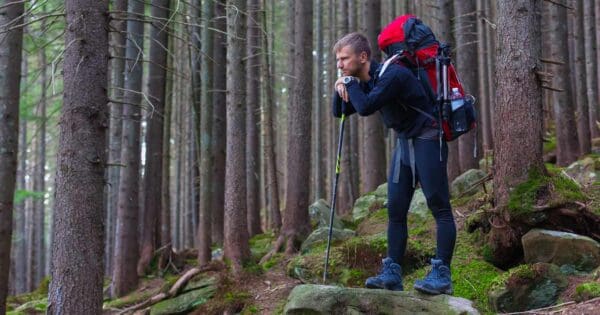How hiking can boost your perinatal mental health
The whirlwind of pregnancy and early parenthood can feel like a beautiful, yet sometimes overwhelming, adventure. Between the hormonal shifts, endless feedings, and the ever-changing routine, it’s natural to crave moments of grounding and peace.
Statistics reveal we’re not alone in this journey. In Australia, 1 in 5 women experience perinatal anxiety or depression, and 1 in 10 men experience depression after a child’s birth. Half of these cases go undiagnosed, highlighting the need for accessible and effective support.
Finding time for self-care amidst the day-to-day whirlwind can be a challenge. Whether you’re carrying a precious life inside you or navigating the early days of parenthood, prioritising your well-being is crucial. Just like taking care of your physical health helps you nurture your growing baby or adjust to your new family dynamic, tending to your emotional and mental needs empowers you to thrive in this transformative time.
That’s where hiking comes in. Imagine lacing up your boots and stepping onto a quiet trail. The rhythmic crunch of leaves underfoot, the sun dappling through branches, the fresh air cleansing your lungs – each step a gentle reminder to reconnect with yourself. Hiking isn’t just about exercise; it’s a sanctuary amidst the demands of pregnancy and parenthood. It’s a break from the four walls, a dose of nature’s solace, and a chance to rediscover the peace that lies within.
If you’re looking for a natural way to boost your mood and overall well-being during this critical period, consider lacing up your boots and hitting the trail.

How hiking benefits your mind and body
Hiking offers a multitude of benefits for perinatal mental health. Spending time in nature has been shown to reduce stress, anxiety, and symptoms of depression. It can also boost your mood, improve sleep quality, and increase energy levels. Additionally, the rhythmic movement of walking can be meditative and promote mindfulness, helping you to focus on the present moment and let go of worries.
Hiking immerses you in the tranquility of nature, a potent antidote to the emotional rollercoaster of the perinatal period. Studies have shown that spending time outdoors reduces stress, anxiety, and depressive symptoms. It can also elevate your mood, improve sleep quality, and increase energy levels.
Imagine the rhythmic crunch of leaves underfoot, the gentle rustle of the wind through trees, and the warm sun dappling your skin. These sensory experiences act as a meditative balm, quieting racing thoughts and promoting mindfulness. You’ll find yourself focusing on the present moment, letting go of worries and anxieties.
Championing perinatal mental health
The Parent-Infant Research Institute (PIRI) in Australia is a leading organisation dedicated to improving the mental health and well-being of parents and infants. PIRI recognises the vital role that nature plays in mental health and actively promotes outdoor activities as a way to support perinatal well-being.
Through initiatives like MumSpace and DadSpace, PIRI provides invaluable resources and support for perinatal mental health.
MumSpace: Your virtual ally
MumSpace is a one-stop online haven for pregnant women, new mums, and their families. It offers a wealth of information and support, from practical tips on navigating pregnancy and early parenthood to online treatment programs for perinatal depression and anxiety.
DadSpace: A platform for dads
DadSpace recognises that dads face unique challenges during the perinatal period too. This dedicated platform provides resources and support tailored to dads, addressing topics like managing stress, building strong relationships with their infants, and sharing the parenting load.

PIRI’s TIPS for hiking with a bump (or a baby)
- Choose trails that are appropriate for your fitness level and stage of pregnancy. Start with shorter, easier trails and gradually increase the difficulty as you get fitter.
- Listen to your body and take breaks as needed. Don’t push yourself too hard, especially during pregnancy. Pushing yourself too hard is counterproductive.
- Stay hydrated and well-nourished. Pack plenty of water and snacks to keep your energy levels up to fuel your adventure.
- Protect yourself (and bub) from the sun and other elements. Wear sunscreen, a hat, and appropriate clothing for the weather.
- Go with a buddy or join a group. Hiking with others can be more enjoyable and safer, especially if you’re pregnant or have a young child.
- Focus on the experience. Instead of worrying about reaching the summit, take time to appreciate the sights, sounds, and smells of nature. Embrace the journey and let nature work its magic.
- Avoid risky situations: It’s important to avoid any risky situations that may lead to injury. This includes hiking on unstable or slippery terrain, crossing streams, or climbing on rocks. If you encounter a risky situation, it’s best to take a detour or turn back.
- Hiking with a baby bump? Check out these tips for hiking while pregnant, so you can confidently hit the trails and enjoy the great outdoors with a baby bump.
Remember, hiking isn’t about conquering mountains; it’s about connecting with yourself and the natural world. With a little planning and preparation, you can embark on a journey that nourishes your body and mind, leaving you feeling refreshed, rejuvenated, and ready to embrace the perinatal period with newfound resilience.
I hope this blog post has inspired you to consider hiking as a way to support your perinatal mental health. With a little planning and preparation, you can enjoy the many benefits of spending time in nature and emerge feeling refreshed, rejuvenated, and ready to embrace this special time in your life.
Happy trails and happy hearts!
Resources and support
- MumSpace: https://www.mumspace.com.au/
- DadSpace: https://www.dadspace.com.au/
- The Parent-Infant Research Institute: https://www.piri.org.au/
For urgent help, speak with your GP or contact one of the following support organisations. They may refer you to another health professional for counselling.
- PANDA (Perinatal Anxiety & Depression Australia) on 1300 726 306.
- Beyond Blue on 1300 22 4636.
- Lifeline on 13 11 14






Great article. Prioritising perinatal mental health is crucial for the well-being of both parents and children. Hiking can make a world of difference. Thanks so much for sharing.